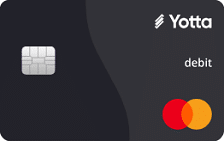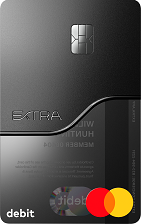
Filter Options
×-
-
Unselect all
-
Unselect all
-
Unselect all

Showing 33 Cards
Sort By Column Name:
Experian Smart Money™
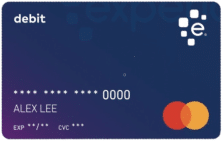

Experian Smart Money™
At a Glance
The Experian Smart Money™ Digital Checking Account and Debit Card is an interesting debit program that works with Experian Boost to help you establish a positive credit history based on the bill payments you already make. The card also comes with a practical welcome offer after meeting direct deposit minimums - all for no annual fee.
- Best Benefits
- Rates & Fees
- Why Should You Apply?
- No minimum deposits and no annual fee
- Works automatically with Experian Boost
- $50 direct deposit bonus
- FDIC-insured savings account
- Foreign Transaction Fee: 3% of the transaction amount in U.S. dollars
- Minimum Deposit Required: 0
- You are new to credit
- You plan on utilizing Experian's extensive knowledge base
- You want an insured deposit account
Grow Credit Mastercard
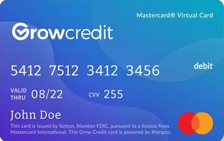

Grow Credit Mastercard
- 0.00% Regular Purchase APR
- 0.00% Balance Transfer APR
- 0.00% Cash Advance APR
At a Glance
Better credit through streaming? That's Grow Credit's interesting approach, where you could see your credit score go up simply by paying for your monthly entertainment subscriptions. Although limited in its abilities, Grow Credit's virtual Mastercard has one main goal: to improve your credit standing with the help of something you're likely already paying for.
- Best Benefits
- Rates & Fees
- Why Should You Apply?
- Grow Credit reports customer activity to the three major credit bureaus each month – which can help you establish, build, or grow your credit over time
- Choose from over 100 available subscription services to pay with Grow Credit
- Multiple membership plans to choose from – granting you enhanced benefits such as prmium subscriptions access & cell phone bill payment
- You can join Grow even if you have a limited or no credit history
- Regular Purchase APR: 0.00%
- Balance Transfer APR: 0.00%
- Cash Advance APR: 0.00%
- You want to establish or build up your credit standing
- You have multiple subscription services that you pay for on a regular basis
- You prefer to have all your subscriptions under the same payment method with minimal fuss
BusyKid Spend Card
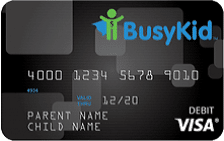

BusyKid Spend Card
At a Glance
The BusyKid Spend Card is a prepaid Visa debit card that works with the BusyKid mobile app. The app provides a streamlined allowance and chore interface, with a number of cool tools for kids, including investments, charitable donations, and more, for one great low price.
- Best Benefits
- Rates & Fees
- Why Should You Apply?
- 30-day money-back guarantee
- Parental match feature encourages saving
- Great value for large families
- Easily add a co-parent with separate account.
- Kids can invest with more than 4,000 stocks
- Annual Fee: See Terms
- Foreign Transaction Fee: $2.50 per transactio
- Over Limit Penalty Fee: $.50 (starting on the fifth decline in a month)
- You have multiple children
- Financial literacy and education is important to you
- You want to provide your children with robust and independent spending tools
GoHenry Card
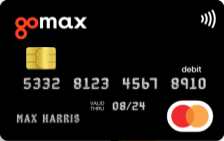

GoHenry Card
At a Glance
The GoHenry card is a debit card created for kids and teens to start learning and taking control of their finances. Designed for both children and parents to be involved in setting goals, controlling spending, and building good habits, it also features benefits such as setting chores and managing a savings account.
- Best Benefits
- Rates & Fees
- Why Should You Apply?
- Flexible parental controls such as setting spending limits and being able to choose where the child's card is used
- Chores can be set up in-app and checked off when they're completed
- The GoHenry app offers a savings account option where savings goals can be set by cardholders and parents can lock and unlock
- Real-time updates via the app to know when, where, and how much children are spending
- All accounts are FDIC-insured with no risk of overdraft
- Minimum Deposit Required: $2.00
- You have children or teenagers and are interested in teaching them about how to manage their finances and budget effectively
- You want a card where you can control your kids' spending and allowance
- You're interested in setting up a savings account for your child with flexible goals and target dates
- You want to reward your kids for completing chores via a streamlined banking app experience
Greenlight Debit Card
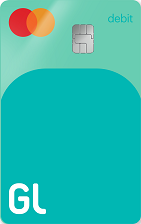

Greenlight Debit Card
At a Glance
The Greenlight Prepaid Mastercard is a debit card that works with the three plans that make up the Greenlight allowance and chores app. The card provides comprehensive controls for parents while teaching kids about the value of money - and hard work.
- Best Benefits
- Rates & Fees
- Why Should You Apply?
- Teach your kids about money and help them get a leg up on their financial future
- Earn money through chores, set savings goals, spend wisely, and invest
- Parental controls including real-time notifications, balance tracking, merchant category blocks, mobile payments, and more
- Set ATM cash withdrawal limits
- Annual Fee: See Terms
- You have multiple kids and want them all to have a debit card
- You want to teach your kids about investing
- You want access to comprehensive parental controls, including limiting dangerous merchants
You've viewed 5 of 33 credit cards
What Are Debit Cards?
Debit cards, also known as bank cards or check cards, are a type of payment card that allows you to access funds directly from your bank’s checking account. When you purchase something using a debit card, the bank immediately deducts the funds from your checking or savings account.
When using a debit card, you’ll typically need to enter your personal identification number (PIN) or provide a signature to authorize the transaction. However, the latter quickly disappears in favor of the former. The purchase amount is deducted from your account balance, eliminating the need for credit or borrowing, and as a result, there are no missed payments and no adverse credit impacts.
What are Prepaid Cards?
Prepaid cards, also known as prepaid debit cards or reloadable cards, are payment cards that allow you to load funds onto the card before making purchases. Unlike credit cards, which allow you to borrow up to a certain limit, prepaid cards require you to load money onto the card in advance. This means that you can only spend the amount of money that is available on the card, making it a useful tool for budgeting and managing your expenses.
Prepaid cards come in various forms, including general-purpose prepaid cards that can be used anywhere that accepts card payments and prepaid cards specifically designed for travel or specific retailers. They are typically issued by banks, credit unions, or other financial institutions and can be purchased online or at retail locations.
How Do Debit and Prepaid Cards Differ?
A prepaid debit card is another great option if you can’t access a bank account. Prepaid cards are similar to debit cards in that purchases are automatically and instantly debited from the card’s available balance. However, unlike a standard debit card, prepaid cards are loaded before use and are not tied to a checking account.
Here are some of the key differences between prepaid cards and debit cards:
| Prepaid Card | Debit Card |
|---|---|
| Preloaded with funds | Connected to checking account |
| Must be reloaded | Funds replenish with direct deposits |
| No overdraft | Overdraft available |
Plenty of financial institutions offer these cards, from Chase to American Express. Some are even co-branded with companies like Walmart, PayPal, and Kroger. The application process does not involve a credit check, so getting one is as simple as submitting the necessary form, which you can generally do online.
What are the Benefits of a Debit or Prepaid Card?
Debit cards offer a huge array of benefits. Firstly, debit cards can help you stay within your budget. Since a debit card only allows you to spend the money you have, it prevents overspending and helps you avoid debt. Secondly, a debit card provides convenience. You can use it for online shopping, bill payments, and even cash withdrawals from ATMs.
No Interest Charges
With debit cards, there is no interest charged. As mentioned, you can spend what is in your account with a debit card, with anything over that limit either denied or approved but with an over-the-limit fee. Despite that, there are no interest payments with a debit card or minimum payments due at the end of the month. Make a purchase or transaction, and that amount is debited or credited to your account. It’s that simple.
Surcharge-Free ATM Access
Many banks, credit unions, and fintech lenders offer a robust network of fee-free ATMs. Here is a quick rundown of the fee-free ATM networks for major banks:
| ATM network(s) | Number of Fee-free ATMs |
|---|---|
| Bank of America | 16,000+ |
| Chase | 18,500+ |
| Discover/ Allpoint/ MoneyPass | 60,000+ |
| Wells Fargo | 12,000+ |
| Co-op (credit union network) | 33,000+ |
| USAA/ Allpoint/ MoneyPass/ PNC | 55,000+ |
Convenience
Debit cards streamline the purchase process and eliminate the need for older payment methods, like checks. Currently, approximately 99% of merchants accept Visa, Mastercard, Discover, or American Express payment cards. Even better, many retailers let you charge an extra price to your in-store purchase and give you back that extra amount as cash back.
Rewards
Some debit cards offer rewards in the form of points or cash back. Debit card rewards are usually lower in quantity than credit cards, but most debit cards come with relatively modest fees.
Are There Drawbacks with Debit Cards?
Debit cards are useful tools, but they aren’t perfect.
Fees
While most debit cards avoid annual fees, some reward and high interest (think APY, not APR) debit cards charge a monthly plan fee for the best rewards. Beyond program fees, debit cards might feature charges for a whole lot of things you might have never considered, including:
- Cash reload (in-store with select brands)
- ATM balance inquiries
- Out-of-network ATM surcharges
- Overdraft fees
- Foreign transaction fees
- Card replacement or expedited delivery
Limited Fraud Protection
Credit cards provide greater purchase protection than debit cards. Credit cards offer robust Zero Fraud Liability protection, including chargebacks, something debit cards lack.
A chargeback is a form of refund where the card issuer refunds the purchase price to a cardholder at the cardholder’s request. Unlike a merchant-initiated refund, chargebacks allow credit cardholders to regain their money from an unscrupulous or dishonest merchant. Despite this, most debit cards protect unauthorized purchases for up to 60 days after a transaction – provided you notify the bank or credit union.
How Can You Get a Debit Card?
Because debit cards require no “hard” credit check to open (some banks may perform a “soft pull” to verify identity and view your credit profile, but these checks will have no adverse impact on your credit score), they are much easier to access for consumers of any type. Additionally, debit cards have no real age restrictions, meaning specialized products exist for teens to help introduce them to banking and financial responsibility.
Because debit cards are tied to a checking account, the easiest way to get your hands on a new debit card is by visiting the local branch of your preferred bank or credit union and opening a checking account. Most banks and credit unions give you a free debit card when you open an eligible checking account, with the debit cards either issued in person or through the mail within 7 to 10 business days.
Essential Features of Debit and Prepaid Cards
Like credit cards, debit (and prepaid debit) cards offer basic protections to keep you safe while you shop online or in-store. For instance, debit cards are typically associated with card networks such as Visa, Mastercard, or American Express, enabling global acceptance. The card network logo on your debit card indicates where it can be used, typically worldwide, although foreign transactions may incur a fee.
Beyond basic protections like Zero Fraud Liability, lost and stolen card reporting, and credit score monitoring, debit and prepaid cards provide other conveniences for cardholders, including ATM access, digital/mobile wallet compatibility with Apple Pay, Google Pay, Samsung Pay, PayPal, and other services, and EMV chip technology for boosted security when shopping.
How to Choose the Right Debit or Prepaid Card
Choosing the right debit card doesn’t have to be tricky. You’ll need to consider various scenarios and pieces of information, such as how often you plan to use your card, how much you plan to spend on your card, and any fees you might incur for using the card (including out-of-network ATM access, foreign transactions, card replacement, overdraft, and other charges).
Consider your needs closely before selecting a new checking account or debit card. Assess your financial goals and spending habits to determine the features and benefits you require from a debit card. Consider factors such as ATM access, rewards programs, international usage, and budgeting tools offered by different banks.
Here are the critical things to look for in a new debit or prepaid card:
| The Most Important Things to Look for with Debit Cards: | |
|---|---|
| Fees | Are there monthly fees associated with the account? Are there fees for ATM withdrawals, foreign transactions, etc.? |
| Rewards | Does the card offers a rewards program such as cash back, cryptocurrency, or other types of perks? |
| Payment network | What payment network does the card use? Mastercard and Visa enjoy wider acceptance than Amex, for example. |
| Add. features | Does the card offer ID theft protection, Zero Fraud Liability, or special discounts with select merchants? |
| Account management | Debit cards, unlike credit cards, are tied directly to your bank account balance. Because of that, you should find a program or application that can help you easily keep track your current balance at all times. Many banks have their own free mobile banking apps available to download that serve this function, as do separate third-party companies. |
| ATM access | Even nowadays, the motto “cash rules everything around me” can still apply, such as when leaving a tip at a restaurant or haggling at an outdoor craft market. Always know what your daily ATM withdrawal limit is and any fees charged for taking your cash out to avoid ending up in an embarrassing situation at the register. |
| Credit building | Some debit cards now offer the ability to build credit with purchases. These debit cards act like secured credit cards, with the spending limit tied to the balance in your checking account. |
Other items to look for with debit cards include:
- Intuitive online account management and mobile apps: Debit cards are tied directly to your bank account balance, unlike credit cards. Because of that, you should find a program or application that can help you easily track your current balance at all times. Many banks have their own free mobile banking apps available to download that serve this function, as do separate third-party companies.
- Daily ATM withdrawal limits: Even nowadays, the motto “cash rules everything around me” can still apply, such as when leaving a tip at a restaurant or haggling at an outdoor craft market. Always know what your daily ATM withdrawal limit is and any fees charged for taking your cash out to avoid ending up in an embarrassing situation at the register.
- Credit-building: Some debit cards now offer the ability to build credit with purchases. These debit cards act like secured credit cards, with the spending limit tied to the balance in your checking account.
Additionally, carefully research the bank’s reputation for customer service quality and availability, including 24/7 support and quick resolution of any issues. Reliable customer support can be crucial in emergencies or when dealing with potentially fraudulent activities. BestCards helps streamline this process by providing bank and lender ratings in reviews, helping to highlight what our team, the Better Business Bureau, and Trustpilot think about each issuer.
Other Things to Look for in a Prepaid Card
A prepaid card offers much of the freedom and security that comes with using credit cards, even if your past credit history is otherwise holding you back. Keep these tips in mind when selecting a prepaid card to add to your wallet.
- Functional Features: Because every prepaid card works differently, knowing what your card can and cannot do is critical when choosing which one to go with. For instance, some prepaid cards cannot be used to set up recurring online bill payments while others limit the number of ATM transactions you can make. Read the terms and conditions of the card before ever loading it with funds to be sure it will work as you’d like it to.
- Easy Reloading Options: Being able to conveniently add cash to your prepaid card is a major selling point, regardless of the issuer. Most cards allow you to transfer money from a bank account onto it, add money from an online payment processing account, have your employer directly deposit your paycheck onto it, reload it at a physical retail shop, or add funds using a separate reload card bought at a store.
- Be Aware of “Hidden” Fees: When it comes to prepaid cards, “hidden” fees are likely fees that you didn’t know about because you didn’t read the terms and conditions before purchasing the card. Monthly fees and ATM fees can add up quickly if you’re caught unaware, putting you in a more difficult financial situation than the one you may already be in. Take a few minutes to read the fine print before making your decision to remain informed and aware of potential pitfalls ahead.
- Online Management and Monitoring Tools: Because budgeting is so important when using a prepaid card, being able to easily track your spending is as well. Some (but not all) prepaid cards offer a companion mobile app that allows you to see exactly how much you’ve spent on the card and how much you have left, and others grant the ability to reload the card with cash right on your phone or tablet. As nearly everyone has a smartphone on them nowadays, using that tool to keep tally of your finances makes sense… and cents.
- Theft Protection: Unlike cash in many situations, you may be able to recover the funds you’ve added to your prepaid card if it’s lost or stolen. Cards that offer zero liability protection make it easy to replace the card and value on it so long as it’s registered with the issuer, so look for that benefit when making your selection as well.
Guide to Debit Card Rewards
Banks, credit unions, and other financial institutions offer debit card rewards programs to encourage you to use their product by providing a reward when you make a purchase using your card or keep a balance in your checking or savings account. These rewards can come in the form of cash back, points, or even cryptocurrency. Debit card rewards are a fantastic way to offset costs during the holidays or to earn interest on money sitting in your bank account. If you’re already using your debit card, you should be getting something in return.
How do Debit Card Rewards Differ from Credit Card Reward Programs?
There are a few main differences between debit and credit card rewards programs. When you use a credit card to make a purchase, you’re essentially borrowing money from the credit card issuer. You then pay that money back, in part or in full, when you pay your monthly statement. Credit cards are excellent tools for those working to build their credit or those who need to pay a purchase off over time. Debit card rewards typically have more restrictions and regulations, like minimum account balances, to earn rewards or interest on your balance.
What Costs Are Associated With Debit Rewards?
The best debit card rewards programs will charge little to no fees to use the card. Before opening a new debit card, here are a few things to look at:
- Monthly maintenance fees: A charge for having a bank account with whatever institution. This is sometimes waived if you keep a certain amount in your bank account.
- The minimum amount to open: The amount you need to deposit into a new account.
- The minimum balance: The amount you need to keep in your account to avoid further fees.
- Overdraft fees: Charges for making a payment or withdrawal that exceeds the amount available in your account.
- Annual fees: A fee you pay to the card issuer each year to use the card.
- ATM fee reimbursement: Some cards will reimburse any fees incurred for withdrawing cash from an ATM.
- Foreign transaction fees: Fees incurred for using your card outside the U.S.
There are plenty of costs that can be associated with debit card rewards, so it’s essential to do your research before you open an account to avoid paying more than necessary. Many of these costs are similar to standard checking account fees.
How Do Debit Rewards Work?
Sign-up Bonuses
Like credit cards, most welcome offers or sign-up bonuses require new cardholders to do something within a specified window. While credit cards typically require you to spend a certain amount, debit cards and checking accounts will require you to deposit a certain amount. These bonuses won’t be thousands of dollars but typically range from $100 to $300 and require a direct deposit totaling $500 or more into your account. It’s important to thoroughly read the terms and conditions to know exactly what you need to do to earn your bonus.
Annual Percentage Yield (APY) Bonuses
In simple terms, APY is the interest you earn from the money in your account. According to a recent survey by Bankrate, the national average APY for savings accounts is 0.57%. However, premium debit cards like the M1 Spend Visa Debit Card, paired with the M1 Plus membership, earn a whopping 3.30% APY – more than five times the national average on savings accounts. No matter the APY, the more you keep in your account, the more you can earn.
Let’s say you open an account with a 5.00% APY and make an initial deposit of $1,000. At the end of the year, you’d have $1,050 – making $50 in interest. If you open an account with a 3.00% APR but make an initial deposit of $5,000, you’ll end the year with $5,150 – making $150 in interest. It’s important to keep your balance high while balancing the need to earn rewards on purchases.
Rewards Structures
The rewards structure for debit card rewards programs will be similar to credit cards. Some cards will earn a certain number of points per dollar spent on purchases. Some purchases might earn more points per dollar than other purchases.
Instead of points, your debit card might give you cash back on your purchases, often 1% to 3% back on specific categories of purchases – think grocery stores, gas stations, restaurants, and select merchants. Sometimes, there are limits to how much cash back you can earn in any given month or quarter. Other times, you can earn as much as you can spend. This is yet another reason why it’s so important to compare the best debit and prepaid cards.
If you want to use cryptocurrency for your daily purchases, you can also get debit cards that use and earn crypto. Points and cash back are certainly more popular for debit cards, but it’s still worth mentioning that the option for crypto debit cards exists.
Are Reward Programs Worth It?
Debit card reward programs can undoubtedly be worth it if you take full advantage of a card’s opportunities. The most important thing is understanding how the card works. You need to limit the amount you’re paying in fees and maximize your earnings. Although they take some research and might charge minor fees, the benefits can outweigh the costs for most people.
Best Practices for Using Debit Cards
Once you get your new debit card, you will probably want to use it to get the stuff you want. Before doing so, ensure you are ready to follow best practices designed to safeguard you while you shop or bank.
Keep Your Info Safe
Treat your debit card like cash by keeping it secure and always avoiding sharing it with others. Additionally, memorize your PIN and avoid writing it down or sharing it with anyone. Be cautious when entering your PIN at ATMs or point-of-sale terminals to prevent others from observing it.
You should also regularly monitor your account for fraudulent activity. Keep a close eye on your account activity by reviewing your statements or accessing your account online. Report any suspicious or unauthorized transactions to your bank immediately.
Stay vigilant against phishing attempts, which are fraudulent messages or calls that appear to be from your bank or a trusted source. Be cautious about sharing personal or financial information via email, phone, or other electronic channels, such as your card number or PIN. Remember, your bank will never ask for your PIN or additional sensitive information via email or phone. If you receive such a request, it is likely a scam.
Maintain accurate contact details with your bank, including your current phone number and email address. This will ensure you receive important notifications and alerts regarding your debit card transactions. Also, familiarize yourself with the security measures provided by your bank, such as two-factor authentication, secure online banking portals, and real-time fraud monitoring systems. Utilize these features to enhance the security of your debit card transactions.
Spend Wisely
Staying safe with a debit card is about more than fraud or theft. You also need to be wary of financial hardships through overspending or other unwise behaviors. Some banks offer the option to set spending limits on your debit card, which can help you stay within your budget and minimize the risk of fraudulent transactions. Contact your bank to inquire about this feature and set appropriate limits.
You should also be aware of your account’s overdraft policy and maintain a sufficient balance to avoid incurring overdraft fees. Some banks offer overdraft protection services, such as linking your debit card to a savings account or a line of credit, which can help prevent overdrafts.
Familiarize yourself with any foreign transaction fees or currency conversion charges associated with your debit card. Consider using an alternative payment method abroad, such as the local currency or traveler’s cheques.
Tips for Using a Debit Card Responsibly
While debit cards offer convenience and security, using them responsibly is important. Here are a few tips to help you make the most of your debit card:
- Keep track of your transactions: Regularly review your bank statements or use online banking to monitor debit card transactions. This will help you identify any unauthorized charges or errors.
- Set up alerts: Many banks provide the option to set up alerts for debit card transactions. You can receive notifications via email or text message whenever a transaction is made, helping you stay informed about your account activity.
- Protect your PIN: Never share your PIN with anyone, and avoid using obvious numbers (such as your birthdate) that can be easily guessed. Memorize your PIN instead of writing it down and cover the keypad when entering your PIN at ATMs or point-of-sale terminals.
- Be cautious with online transactions: When making online purchases, ensure that you are on a secure website that encrypts your payment information. Look for the padlock symbol in the browser address bar to confirm the website’s security.
Conclusion
Debit cards offer a convenient and secure way to manage personal finances, providing direct access to funds without the risk of debt. Understanding the differences between debit cards and credit cards and implementing best practices for usage will empower you to make informed financial decisions. By considering your needs and conducting thorough research, you can select the debit card that best suits your requirements and enhances your banking experience.
Check out more
Prepaid & Debit Cards
Editorial Disclosure – The opinions expressed on BestCards.com's reviews, articles, and all other content on or relating to the website are solely those of the content’s author(s). These opinions do not reflect those of any card issuer or financial institution, and editorial content on our site has not been reviewed or approved by these entities unless noted otherwise. Further, BestCards.com lists credit card offers that are frequently updated with information believed to be accurate to the best of our team's knowledge. However, please review the information provided directly by the credit card issuer or related financial institution for full details.

